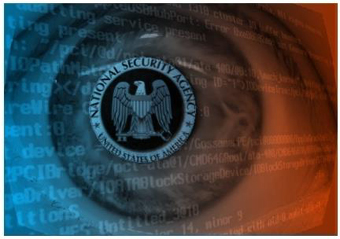
Turnkey Tyranny: Or, If I am Not Doing Anything Wrong, I Have Nothing to Fear, Right?
By Kevin Robbie | Monday, January 6, 2014 |
Thursday Review Contributor
America’s favorite whistleblower, Edward Snowden, is in the news again. He recently issued an open letter to the people of Brazil and also made a televised address to the people of the United Kingdom. He even offered to assist the Brazilian government in investigating spying activity being conducted in Brazil by the National Security Agency.
Also, both the British newspaper The Guardian and the New York Times have recently stated that Snowden’s actions “were of such public importance that they outweigh any possible wrongdoing.” Indeed, that position is the crux of the debate—balancing the public’s need to know, and right to be informed—against the need to protect from disclosure information regarding national security.
Or, in a wider view, free speech as defined by the Bill of Rights versus the security of the United States.
Snowden’s predicament raises both legal and ethical questions. In fact, since the disclosure of those documents to the media, no fewer than five lawsuits have been filed challenging the legality of the programs which the National Security Agency claims were exposed. Additionally, a dozen bills have been introduced in Congress to bring about a measure of transparency to surveillance activities of this kind. (See The NSA Super Hackers, And Your Cell Phone Secrets; Thursday Review, December 31, 2013).
Documents leaked by Snowden in June, 2013, indicated such extensive spying was, indeed, being conducted by the NSA in Brazil. The agency’s conduct has included monitoring the cell phone of Brazil’s president and even hacking into the network of Brazil’s state oil company, Petrobras. Cloaked in such secrecy, it is difficult to comprehend how collecting data on Brazilian oil production affects the security of the United States. Critics of Snowden have claimed that his actions in Brazil were a veiled attempt at being granted political asylum. Snowden has been currently living in Moscow, Russia, since the document leaks in June. He faces potential legal prosecution if he returns to the United States.
The term whistleblower was coined in the modern context, by activist Ralph Nader in the 1970’s. The Whistleblower Protection Act (WPA) protects any “disclosure by a covered employee who reasonably believes the disclosure shows evidence of a violation of the law or a danger to public safety…” So the threshold legal question is raised – Is Edward Snowden a whistleblower under federal law?
First, the nature of Snowden’s employment is an important legal question. Was Edward Snowden a “covered employee” under the WPA ? He worked for Booz, Allen, Hamilton, one of the largest private security contractors in the country. He was not directly an employee of the federal government or a federal agency. Intelligence employees of the CIA, FBI and NSA, among other “alphabet” agencies, are excluded from protection. Under a strict definition of the statute, Snowden might not be a “covered employee.”
Second, only Snowden himself knows what his actual motivation was when he leaked documents to the media. However, he could have reasonably believed the law was being violated and/or that a serious abuse of authority was taking place endangering the public based on the events which have transpired since the leaks.
Snowden’s disclosures have benefited the public by igniting debate on this controversial topic and exposing danger to the public. Lawsuits have been filed and bills introduced in Congress.
By contrast, we have not been informed by the government as to how the disclosures threatened national security. Apparently, we are just supposed to take the government at its word. The position of the intelligence community seems to be “we can’t tell you what secrets were revealed because we can’t reveal secrets. Trust us.” Even President Obama has stated that this debate is “healthy for our democracy,” though he avoided any direct answer when pressed by reporters recently to weigh-in on the law enforcement or jurisdictional outcome of Snowden’s various legal problems.
Still, the debate would not have been possible without Edward Snowden. Representative James Sensenbrenner (R-Wis.), the author of the Patriot Act, described the scope of the government’s data collection “deeply troubling.”
The momentum gathered by this story in the media indicates an ongoing public thirst for knowledge regarding their government’s secret activities. Indeed a properly informed populace is the foundation of our republic. President James Madison said, “A popular government, without popular information, or the means of acquiring it, is but a prologue to a farce or a tragedy; or perhaps both.” President Madison’s statement is especially poignant now. We need to be informed, or provided access to information, in order to prevent a farce or tragedy from engulfing us.
Related Thursday Review articles:
Privacy, the NSA and the Disruption of Terror, Thursday Review; June 20, 2013.
Thwarting Terror: How Much of Your Personal Data is Enough?; Thursday Review; December 27, 2013.
